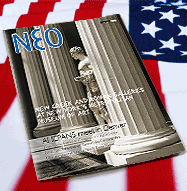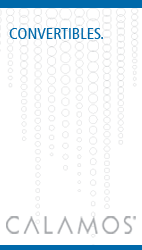 |








|
 |
|
AHEPAs Converge in Colorado
|
  |
On the current issues AHEPA is pursuing:

Our issues after the convention in Denver will be to finalize the visa waiver issue for Greece. That’s a big issue for all Greek Americans. We want to see Greece included in the original EU countries to get the visa waiver, so we’ve been pushing very hard. We’re confident that something will be passed. In our meetings at the State Department, and with Homeland Security, and with the Executive Branch, the Supreme President has laid out a very good argument that basically says, look, all the criteria have been met. Greece having the most successful and security-safe Olympics, Greece has addressed the problems and addressed the issues, and Greece should be allowed to be included automatically. And I think the American government was receptive. All we have to do is coordinate all the offices to understand that everything has been met. I think they have heard us.
Another issue is the Brumidi recognition on Capitol Hill. You may or may not know that Konstantino Brumidi was the artist that painted the Capitol dome and several galleries in the Capitol Building. His original name was Broumides, his father was Greek, his mother was Italian, but they left Greece and ended up in Italy and Mr. Brumidi came to the United States in the 1860s. And he’s commonly referred to as the Michaelangelo of Washington DC. If you’ve ever been to the Capitol Building you’ll see the frescos. They’re absolutely beautiful. And we’ve been working very hard to get him a Congressional Gold Medal of Honor recognition. That’s not a military medal, that’s a civilian medal. We’re working very closely with the Italian American organizations to get this recognition for Mr. Brumidi.
We’ve also tried to keep the Greek language alive in some fashion. We’ve tried, and we’ve succeeded in some areas, namely in Wilmington Delaware, where there’s a Greek immersion charter school, but this is an AHEPA Greek immersion charter school. There are other immersion charter schools which are far more older in age because they’ve been worked on for quite some time. But the AHEPA believes that we need to preserve the language and by preserving the language we can preserve a lot of our customs and heritage because with language comes—the festivals, the dancing, the culture—all that. If you lose the language, you lose a lot of things. We’re trying to get different chapters to see if they can investigate how to start Greek immersion charter schools in their cities, as well.
We also want to promote our scholarship programs. This year we gave over $100,000 on a national level, but several million dollars on a local level. Every chapter and every district in AHEPA gives money out every year. The number fluctuates, but we estimate it between $1.5 and $2 million a year.
We have about 400 active AHEPA chapters and about 250 active AHEPA Daughter’s chapters and a few dozen Sons and Maids chapters. We have about 750 AHEPA family chapters. The AHEPA family has a membership of about 35,000.
In the past we’ve several programs and projects, some of which have become permanent, like the AHEPA Cooley’s Anemia Foundation, which is a permanent foundation in the AHEPA that raises money and awareness for Cooley’s Anemia, and we’ve done a lot of fundraising and donated hundreds of thousands of dollars in research. Our monies and our efforts have extended the life expectancy of individuals with this disease from 30 to about 75 years now.
Other issues include the AHEPA Bone Marrow Registry. We have a unique AHEPA registry which identifies individuals in the Greek American community to become donors for people in need of bone marrow, which is of course a cure for cancer. That’s something that is uniquely AHEPA. We have 28,000 people that have signed up in the registry—which is a good grouping because the amount of donors needed in a donor match is 1 in 25,000.
On the purpose of the convention:
This is the 85th Anniversary of our existence and the convention has been running every year since 1922, with the exception of a small 2-3 year period during the Second World War. The convention brings the AHEPA family together to deliberate over what we’ve done this past year or two years and what we want to do in the future. How we want to refocus our efforts to increase our membership and presence in the United States as philhellenes or Greek Americans or whatever term you want to use. The age group of our members fluctuates. We have members that are 35 and we have members that are 85. Each chapter has its own identity and each chapter performs civic duties in their communities, whether it’s voter registration, whether it’s running soup kitchens, whether it’s donating items to soldiers in the field, the AHEPA means a lot to a lot of people. It does not have one mission, it has several.
On AHEPA staying relevant:
That’s a difficult question only because it’s challenging. But it’s a challenge that every member-based organization faces, not just the AHEPA, but every group. How do these social member organizations stay alive? And I say to you this, that the AHEPA has experienced the least amount, percentage wise, the least amount of drop in membership because of our oath and obligation to the organization. Bringing new members in is a challenge because new members today 20-30 year olds, people that are newlyweds, people that are starting families, are not in the same position that our fathers and grandfathers were 40-50 years ago when the AHEPA was used as a social outlet, a gathering spot—the men going to play tavli or whatever. They don’t need that today. That’s not its purpose anymore. For someone to consciously join an organization they’ll never have time for, because they’re running around to soccer practice, or baseball practice, or dancing, or whatever it is that they do if their children are small—when they join an organization like this under those circumstances it’s a conscious decision they make to participate. So we get members, they don’t stay active in attending the meetings, or every single meeting, but they try to stay associated with an organization that uniquely identifies them as Hellenes. I think the AHEPA does that. And the church does that, too. It’s an identity thing. You learn that at church, and the AHEPA does that to the same degree, but on a different level. AHEPA has a lot to offer, a lot of history, a lot of heritage, a lot of knowledge and it’s a wonderful thing to be part of a brotherhood like this because it’s done a lot of good, it does a lot of good, and it will continue to do a lot of good.
I’ve been executive director since 2002. I came to Washington in ’91 to work for AHEPA. I was elected to the national leadership and served in various elected positions in the AHEPA when I wasn’t employed here—you can’t do both. Anyway, it’s just my turn to be here, the guy who follows me, it will be his turn. I grew up in the AHEPA, I was the international president of the Sons of Pericles and I got to travel the country in 1989 as the Supreme President of the Sons. And I was active member of the Sons for many years before that in my hometown in Philadelphia. And it was an eye-opening thing for me to feel pride in being a Greek—I shared the same thing with kids in California, and in Canada, and in Mexico, wherever we went. Wherever you went you would find a pocket of Greek kids and it was always like going home.

The American Hellenic Educational Progressive Association (AHEPA), the leading association for the nation’s 1.3 million Americans of Hellenic heritage and Philhellenes, embarks on a week excursion to Denver, Colorado, (Adam’s Mark, 1550 Court Place,) July 10 - 15, 2007 for the 85th Annual AHEPA Family Supreme Convention. Attendees will include members and their families from the United States, Canada, Greece, Cyprus and Australia.
More than 2,500 Hellenes are expected to participate and conduct the organization’s business agenda, honor those who have achieved excellence in their respective professional careers and conventioneers share in their common ethnic heritage and cultural background by attending educational, cultural and social events.
|
 |
|
|
| ©2009 NEOCORP MEDIA |
|
 |
 |
|
|




|